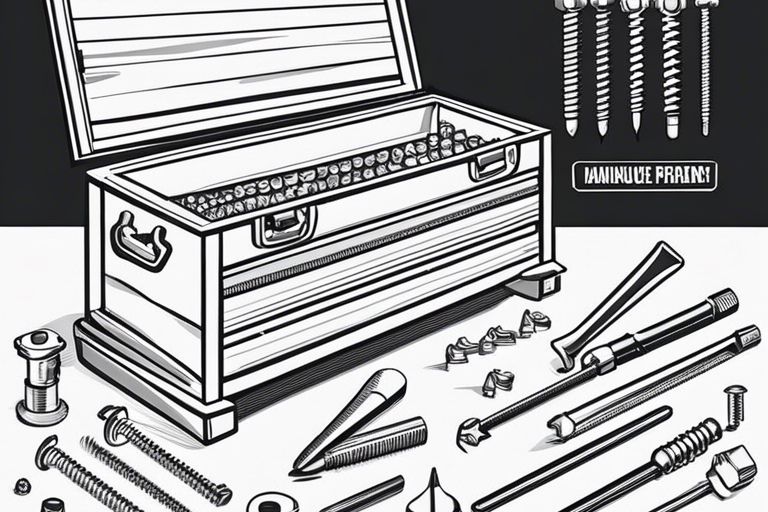Expert Tips For Choosing Between Screws And Glues In Home Repairs

Just as Mark Twain once said, “The secret of getting ahead is getting started.” Regarding home repairs, knowing whether to reach for the screws or the glue can make all the difference. In this informative guide, we’ll provide expert tips to help you navigate this crucial decision with ease. Learn the benefits and pitfalls of each option, and gain the confidence to tackle your next repair project like a pro.
Key Takeaways:
- Screws provide a stronger hold than glues in most home repair situations.
- Glues are best for non-load-bearing applications and can be a quick fix for minor repairs.
- For a more permanent and durable solution, screws are the way to go, providing long-lasting stability and strength.
The Screws’ Side of the Story
When to Choose Screws for Strength and Stability
Side with screws when you need strength and stability in your home repairs. Screws offer a secure hold that can withstand heavy loads and provide long-lasting durability. When working on projects that require structural integrity, such as hanging shelves or building furniture, opting for screws is the wise choice.
The Advantages of Screws in Load-Bearing Applications
Stability is key when it comes to load-bearing applications, and screws excel in this area. Advantages of using screws include their ability to grip tightly into the material, preventing shifting or loosening over time. This makes them ideal for securing weight-bearing structures like deck railings, stair treads, or door hinges.

The Glue’s Got Talent
Even Should You Use Wood Glue, Screws, or Both?, the debate between screws and glues continues in home repairs. Let’s explore into the world of glue and explore its unique talents.
When to Opt for Glue for a Strong Bond
Glues can be a great choice for projects that require a strong and permanent bond. In instances where the joint may not be visible and there is no need for future disassembly, opting for glue can provide a clean and seamless finish.
The Benefits of Glue in Delicate or Precision Work
With the ability to penetrate into small crevices and create a uniform bond, glue excels in delicate or precision work. Glue can also distribute stress evenly across the joint, which is imperative in fragile materials that may be susceptible to cracking under pressure.
The Battle of the Bond
Unlike Glue vs. Screws: Which one is stronger?, the choice between screws and glues for home repairs can be a tough one. Let’s probe into the holding power and factors affecting the strength of these bonding methods.
Comparing the Holding Power of Screws and Glue
| Screws | Glue |
| Screws offer a mechanical grip and are easily removable. | Glue provides a seamless, invisible bond. |
Factors Affecting the Strength of the Bond
An adhesive bond from glue or a mechanical bond from screws can be influenced by several factors. Let’s explore:
- Surface Preparation:
The cleanliness and roughness of surfaces affect adhesion. - Material Compatibility:
Ensure that the adhesive or screw is suitable for the materials being bonded. - Curing Time:
Allow sufficient time for the adhesive to cure or the screw to set properly.
Recognizing these factors can help you make an informed decision on whether to choose screws or glue for your next home repair project.
To wrap up
As a reminder, when deciding between screws and glues for your home repairs, consider the strength needed for the job, the material of the surfaces being joined, and the ease of future repairs. Each has its own advantages and best uses, so choose wisely to ensure a long-lasting and effective fix. Recall, a well-selected screw or a carefully applied glue can save you time, money, and headaches in the long run.
FAQ
Q: Why would I choose screws over glue for home repairs?
A: Well, my friend, screws provide a stronger and more durable hold compared to glue. They are ideal for fixing things that need to withstand a lot of weight or pressure.
Q: When should I opt for glue instead of screws?
A: Ah, that’s a good question! Glue is perfect for delicate items or materials that could be damaged by drilling. It also creates a seamless finish without any visible hardware.
Q: How do I decide between screws and glue for a specific repair?
A: Consider the materials you are working with, the weight the item needs to support, and how permanent you want the fix to be. For temporary fixes or cosmetic repairs, glue might be the way to go.
Q: Are there any tips for using screws effectively in home repairs?
A: Indeed! Pre-drilling pilot holes can prevent wood from splitting, while selecting the right type and length of screws ensures a secure attachment. Additionally, using a screwdriver with a comfortable grip can make the job much easier.
Q: Any advice for working with glue in home repairs?
A: Absolutely! Make sure to follow the manufacturer’s instructions for the specific type of glue you are using. Clean and dry the surfaces to be glued, apply the glue sparingly, and use clamps to hold the pieces together until the glue dries for a strong bond.